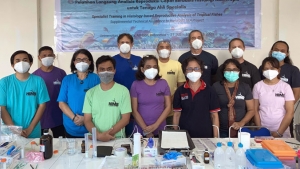
Sustainable fisheries management requires accurate stock assessments, which often depend on reliable fish life history. To build capacity in fish life history studies, a three-week Specialist Training in Histology-based Reproductive Analysis of Tropical Fishes at Pattimura University in Ambon, Maluku, Indonesia during July and August was led by scientists from the University of Hawaiʻi at Mānoa School of Ocean and Earth Science and Technology (SOEST) and Windward Community College.
Indonesia has the world’s second largest fisheries by catch and harbors incredible diversity of marine species across a sprawling archipelago. The effective management of Indonesia’s fisheries relies on the development and adoption of sustainable harvest strategies. Key to a sustainable approach are stock assessments that include scientifically robust information on the fishery and marine resources including their life history traits.
Dedicated participants, training enhances capacity

Gino Limmon, director of the Maritime and Marine Science Center of Excellence at Pattimura University, said the training provided capacity building that will enhance the integrity and credibility of scientific information used to manage fisheries in Indonesia and especially in the Maluku and North Maluku provinces.
“Marine fisheries are a vital natural resource for economic export and national food security in Indonesia,” Limmon said. “Sustainable management of fishery resources depends upon good information, and this workshop trained a cadre of Indonesian scientists to generate reliable scientific data to support fisheries.”
Erik Franklin, one of the training instructors and associate research professor at SOEST’s Hawaiʻi Institute of Marine Biology (HIMB), said the training was successful due to the hard work and dedication of the participants and the excellent facilities and logistical support during the event.
“The UH team faced a number of barriers just to get to Indonesia during the pandemic. On our way there and during the workshop, we were provided with excellent support that dealt with any issue immediately,” said Franklin. “The Indonesian participants were collectively the best group that we’ve ever trained, after teaching these approaches in several locations around the western Pacific. We truly look forward to continuing to work with the fishery science community of Indonesia through future training and research collaborations.”
The UH team included Franklin, Ken Longenecker from HIMB, and Ross Langston of Windward CC.
Collaboration and funding
Heather D’Agnes, senior program officer, Environment Program of the Walton Family Foundation (WFF), said that the training directly supported the mission of WFF to enhance the capacity of Indonesian scientists to sustainably manage the diverse and important fisheries of Indonesia.
WFF funded the “Supplemental Technical Assistance (STA) to the United States Agency for International Development Sustainable Ecosystems Advanced” project to Tetra Tech which supported this training workshop. Prior to the start of the training, the STA project equipped the Maritime and Marine Science Center of Excellence at Pattimura University in Ambon with a fully operational histology lab to conduct the training and serve as a resource for future research and training.
Gina Green, PhD, STA project manager for Tetra Tech, said, “The project was a true team effort. Considering all the challenges for this critically important training to have successfully taken place, we were extremely glad we had Dr. Franklin and his team as key and essential players! This project would not have been successful without the University of Hawaiʻi’s participation.”
This work is an example of UH Mānoa’s goal of Excellence in Research: Advancing the Research and Creative Work Enterprise (PDF), one of four goals identified in the 2015–2025 Strategic Plan (PDF), updated in December 2020.

